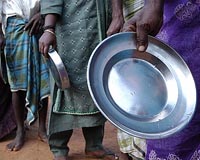 |
Pendjari, Benin (AFP) Oct 18, 2009 It has not rained much recently in the northern regions of Benin in west Africa, the soil is hard and cracking. But from it sprout small and precious white flowers of organic cotton. "At the beginning, we did not think we could cultivate without fertiliser," said Michel Boundia, head of a cotton farmers association in the village of Batia, 800 kilometres (500 miles) north of the commercial capital Cotonou. "But we soon realised that organic cotton allows us to live in better health and that is why we baptised it 'lafia cotton,'" or 'peace cotton' in the local gourmantche dialect, the farmer said. Some 220 Benin cotton growers went organic last year, cultivating 54 hectares with an average yield of 400 kilogrammes per hectare, thanks to the backing of Germany and Helvetas, a Swiss non-governmental organisation. In place of fertilisers, the villagers use natural compost of organic waste and tree branches, which help fight off parasites. "Just as in the good old days, we weed with our hands or with a hoe," Boundia added. To protect the cotton flowers, farmers have replaced industrial insecticides with an organic solution -- the sap of a local plant called the neem. A recent health ministry study showed that 322 farmers in Benin died during the 2007-2008 planting season following the use of fertilisers to grow cotton. "Here we usually receive those who are regularly using fertiliser," Eugene Zounmenou, an emergency doctor in a Cotonou hospital, told AFP. "If quickly attended to, they stay alive, otherwise they die... all because of wrong information on these pesticides dangerous to humans," he said. Alidou Boundaone, a cotton farmer, said going organic was about protecting the health of growers but also made good economic sense. "For us, the first advantage is health. We no longer fall ill as a result of of chemical products," he said. "Secondly, and more importantly, is the economic sense: at the end of the planting season we need to pay debts contracted in buying fertilisers. That is ruinous," he added. There are benefits at the retail end too. Organic cotton sells for 230 FCFA, the local currency in Benin, while non-organic fetches the farmer only about 190 FCFA (0.2 euro). Organic cotton farmers in Benin last year harvested a total of seven tons of cotton -- they expect to produce more than 200 tons between now and 2012. But Benin, Africa's third largest producer of cotton, still lacks factories that can process organic cotton separately from non-organic. Farmers say there also needs to be a label that can guarantee a 100 percent organic origin and an outlet specifically for selling organic cotton. "That is where our struggle begins: to find a factory that will not mix to enable us have an identity that would lead to certification," said Djafarou Tiomoko, director of Pendjari nature reserve and an advocate of organic cotton. Share This Article With Planet Earth
Related Links Farming Today - Suppliers and Technology
 Brazil, China top anti-hunger scorecard: ActionAid
Brazil, China top anti-hunger scorecard: ActionAidJohannesburg (AFP) Oct 16, 2009 Brazil topped an anti-hunger scorecard on Friday followed by China where 58 million people have more to eat but India earned low marks in a new ActionAid index. The study, released on World Food Day, scores the efforts by 50 governments to fight hunger, with calls for more action with more than one billion people in the world already going hungry. "Some of the poorest countries in the wo ... read more |
|
| The content herein, unless otherwise known to be public domain, are Copyright 1995-2009 - SpaceDaily. AFP and UPI Wire Stories are copyright Agence France-Presse and United Press International. ESA Portal Reports are copyright European Space Agency. All NASA sourced material is public domain. Additional copyrights may apply in whole or part to other bona fide parties. Advertising does not imply endorsement,agreement or approval of any opinions, statements or information provided by SpaceDaily on any Web page published or hosted by SpaceDaily. Privacy Statement |